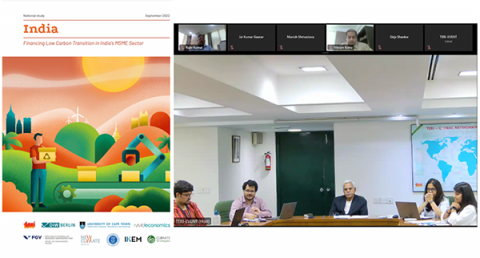Handholding and financial cushioning is crucial to make India’s MSMEs a low-carbon emitting sector: TERI study

New Delhi, October 14, 2022: Transforming India’s Micro, Small and Medium Enterprises (MSMEs) into a low-carbon emitting sector will require financing institutions to steer the interest of stakeholders towards transition by incentivizing it and providing adequate finances for the processes, says a new national study from The Energy and Resources Institute (TERI) launched in New Delhi on Thursday.
Focussing on the urgent need for the country’s MSMEs to move towards Low Carbon Transition (LCT), the study ‘Financing Low-Carbon Transition in India’s MSME Sector’ brought out as part of the Strengthening National Climate Policy Implementation: Comparative Empirical Learning & Creating Linkages to Climate Finance (SNAPFI) project, identifies the major barriers faced by the sector in accessing finance for transition and recommends solutions.
India’s MSME sector is a significant contributor to the economy, however it remains Green House Gas (GHG) intensive, consuming about 25% of the total energy taken by the industrial sector in India. Being a significant contributor to both- the economy and emissions, India’s MSMEs need to transition into a low-carbon emitting sector in order to support achieving the country’s NDCs and other global climate commitments.
Speaking at the launch, Mr RR Rashmi, Distinguished Fellow, TERI, said, “The role of multi-stakeholder partnerships will be critical to access international climate finance and promoting the low-carbon transition.”
Talking about the project, Heiner Von Luepke, Research Associate, German Institute of Economic Research (DIW Berlin), says, “The SNAPFI project is in the third year of its implementation. The overall objective of the project and the study is to strengthen NDC implementation through research-based policy advice especially in the area of finance.”
The study uses case studies from Gujarat and Maharashtra to facilitate a micro level understanding of the policies and instruments available to MSMEs at the state level. It notes that the MSMEs are disproportionately vulnerable to risks posed by climate impacts. The unorganized and informal nature of the sector also poses various challenges for MSME stakeholders in transitioning to energy-efficient technologies and non-fossil fuel-based energy sources, observe TERI researchers and authors Shubhi Goel, Dorothy Ashmita Biswas, Soham Banerjee and Dr Shailly Kedia.
The study explores the status of financial assistance for MSME transition including existing institutional arrangements, cooperation mechanisms, and policy landscape. “Lack of technical capacity, unawareness of existing formal financing instruments and processes, and misconceptions about low-carbon pathways are significant barriers that would have to be addressed in order to bridge demand gaps towards transitioning to an energy-efficient system,” the authors note.
The TERI researchers further highlight that only 16 percent of the sector in India is financed through formal banking systems, while the credit gap for MSMEs is estimated to be about USD 240 billion (about INR 16.66 trillion) in 2018. “An already existing finance gap lends itself to hindering the sector’s transition,” they add.
The study suggests a host of measures including the promotion of an incentive-based model, financial support from large companies, innovative financing models, R&D, demonstrations, and pilot projects for new technologies as well as scaling up capacity building and awareness to expedite the LCT of MSMEs. The transition will only be possible through the support of strong institutions, efficient financing mechanisms, and robust policy interventions, the study says. These institutional arrangements around climate finance in India are the key actors in developing and executing all interventions in the MSME sector, it adds.
SNAPFI report link: https://www.teriin.org/sites/default/files/2022-10/Financing_Low_Carbon_Tranistion_for_India_MSME_Sector.pdf
About TERI
The Energy and Resources Institute (TERI) is an independent, multi-dimensional research organization with capabilities in policy research, technology development, and implementation. Headquartered in New Delhi, TERI has regional centres and campuses in Gurugram, Bengaluru, Guwahati, Mumbai, Panaji, and Nainital, supported by a multi-disciplinary team of scientists, sociologists, economists, engineers, administrative professionals, and state-of-the-art infrastructure.

